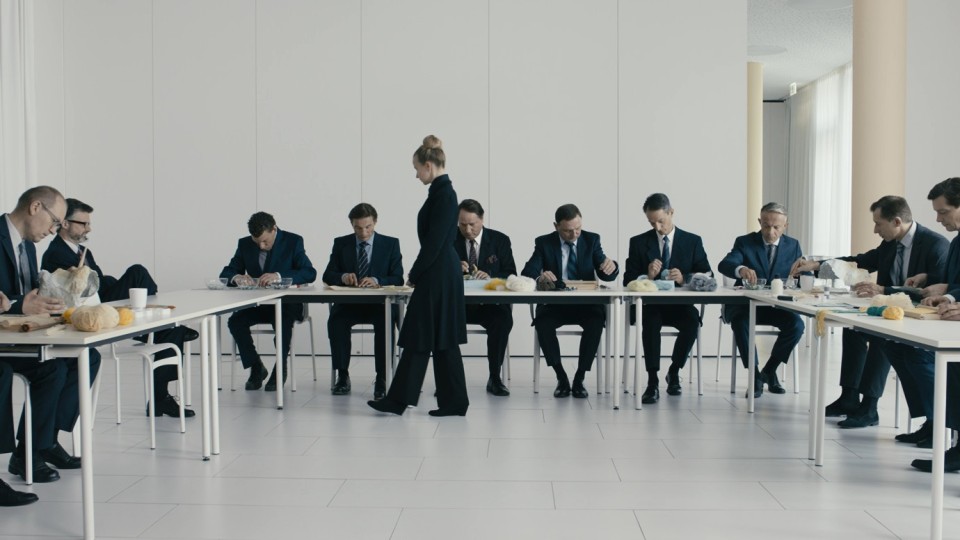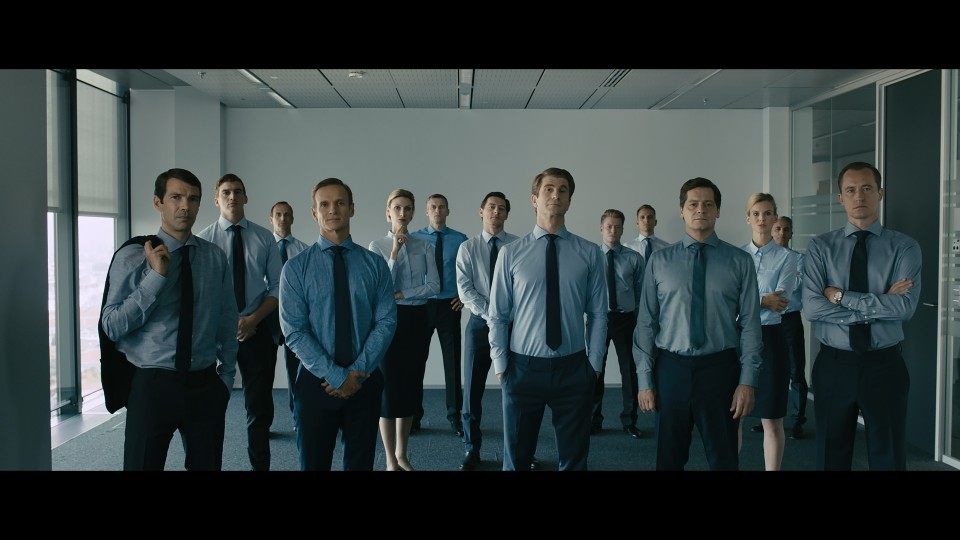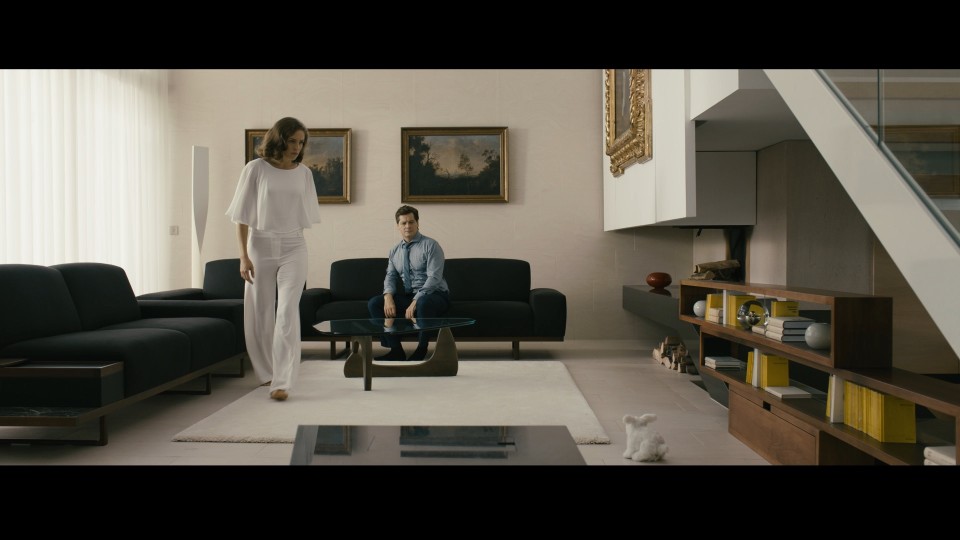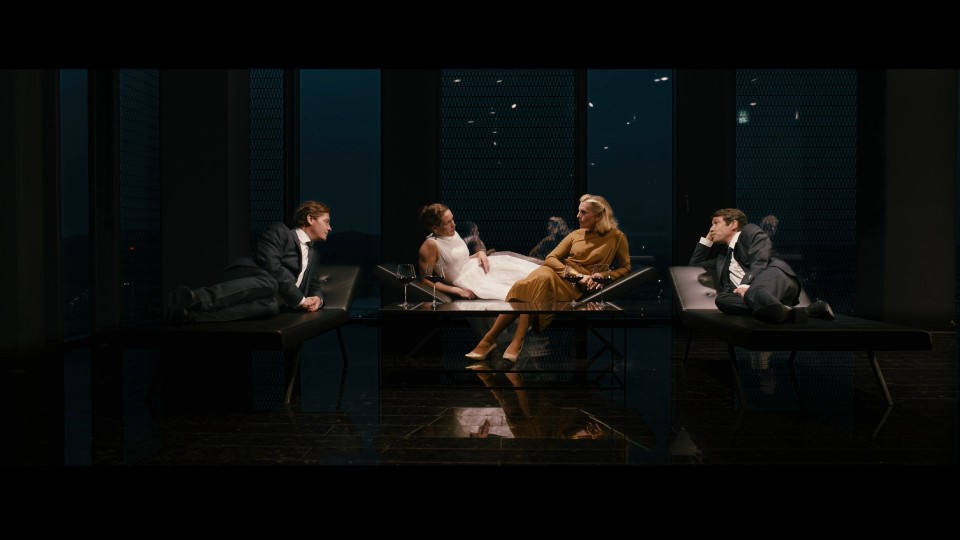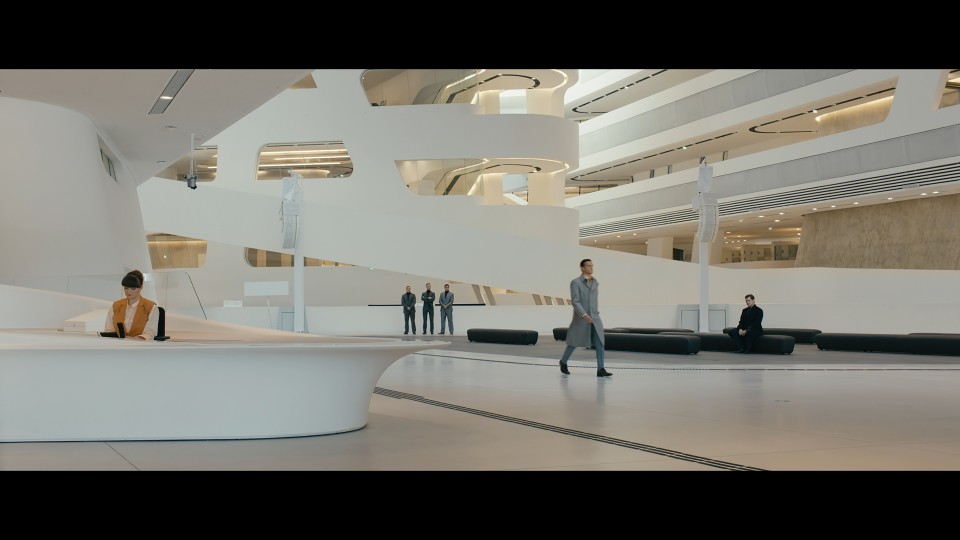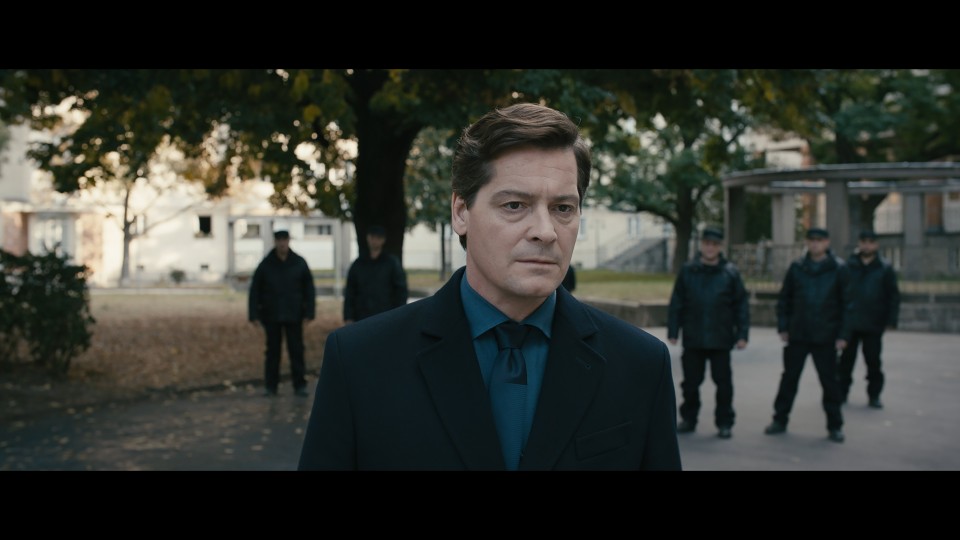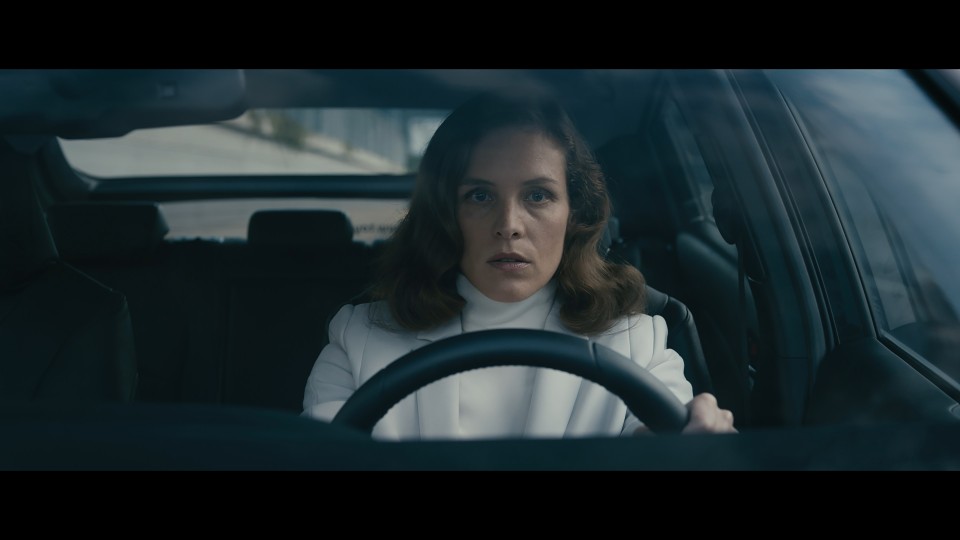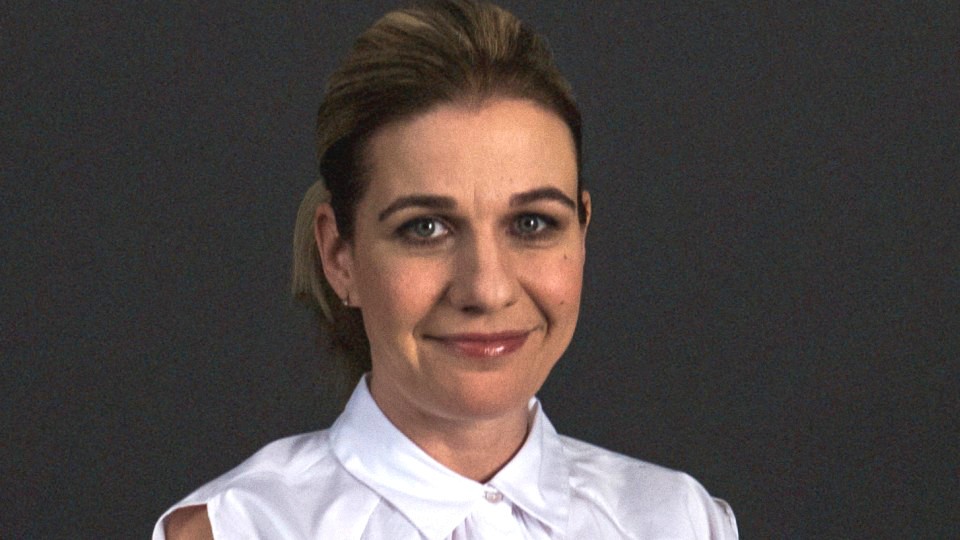The people in Life Guidance have subjugated themselves to the credo of self-optimization and handed their private lives over to an agency. That would
be disturbing enough. But Ruth Mader has tightened the screw by setting her dystopia in a period which seems well within reach
of the present day.
One of the first sequences in Life Guidance shows two couples reclining in what is apparently an expensive restaurant and being fed minute portions of food by waiters.
infantilization and passivity have apparently been taken so far that they constitute an entire lifestyle. It's one of many
scenes where, in minimalist style, social trends are followed to what might appear to be their logical conclusions. Which
perceptions from today inspired you in the development of Life Guidance?
RUTH MADER: I spent a very long time with Martin Leidenfrost, my co-author, analyzing the sense of unease we feel about current social
developments, and we managed to localize a number of crucial aspects. On the one hand we feel that people are going through
a kind of infantilization to the point where they become disenfranchised socially as well as politically. One step in this
direction is the way people are voluntarily storing their personal data on the Internet, which is something we find very sinister.
Huge numbers of people don't seem to have any problem doing that. We also came to the conclusion that social groups are drifting
apart: there are the "working poor", the people struggling to survive in deprivation, and the bank clerk in the film, for
example, is a member of this class. She's a character I didn't need to make up completely: I drew upon my own experience there.
When I go to my bank I see people working there who are shabbily dressed and look neglected, and it makes me wonder how things
have got to the stage in Austria where normal working people end up in such a bad state. And then there are the upper middle
classes, who are subjected to an incredible pressure to succeed: people like our protagonist Alexander, who works in financial
services. We chose to focus on the banking sector because this also ties in with the factor of globalization, which becomes
clear in a short sequence set in Africa.
In your previous films, What Is Love und Struggle, you also focused on social issues and treated them with a semi-documentary approach. What is it that appeals to you about
employing an extremely stylized film genre to give voice to social concerns?
RUTH MADER: Actually, several years ago I wrote a very stylized thriller in the manner of Hitchcock; it was a very powerful screenplay,
but unfortunately it wasn't possible to finance it. So I've been interested in genres, especially the thriller, for a very
long time. We wanted to make a science-fiction film where the shock for the audience lies in the fact that it's set in the
present. If it had the atmosphere of the distant future, it would enable audiences to take refuge in the thought that maybe
the situation shown here will never really come about.
Life Guidance is clearly a work of fiction, but it does perform a balancing act – between the present and the future. How did you
manage to depict this state of temporal limbo in visual and narrative terms?
RUTH MADER: Our key idea was the private Life Guidance Agency, which has the task of optimizing people. In fact we took a large number
of details from real life, from observing the world around us; the man with the rosary beads, for example – I saw a man
just like that on a street in Vienna. I'd say it was a mixture of everyday observation and the agency, which we completely
invented. Of course, the costumes and set design also had a large role to play in creating a world which has a slightly abstract,
future feel but is at the same time full of references to the present day.
One of the most striking features of Life Guidance is the interpersonal relationships within the family. Anna and Alexander behave as though their emotions had been sucked
out of them. It is as though communication between people had reached absolute rock bottom. Depicting that must have been
a great challenge for the actors. How did you find your cast and work with them to achieve that sense of reduction?
RUTH MADER: I have to thank Marion Rossmann for the idea of casting Fritz Karl as Alexander. The first time we met it was anything but
a harmonious encounter, but he did finally agree to undertake the work. Fritz Karl is a very committed, hard-working actor,
and in the end he put himself entirely in my hands while at the same time constantly questioning a great deal about the role.
I hope this film contributes to the realization that he is a gigantic actor who is, unfortunately, cast far too seldom in
the arthouse sector. Katharina Lorenz, who plays Alexander's wife Anna, works at the Burgtheater. She is somebody with a very
powerful aura, but she had an extremely difficult role because she wasn't allowed to show any emotions. Florian Teichtmeister
is also a very gifted actor who has the ability to implement complex instructions flawlessly. My cast came from various backgrounds,
including musicals and TV, as well as non-professional actors. I had to get them all to the level where I could direct them,
which meant intensive work. I held a lot of rehearsals, even for the very smallest roles. A great deal took place during auditions,
where I was present myself. It's important for me to do that, because that way I can learn a lot about potential difficulties,
the direction a scene could go, and so on.
One essential component of Life Guidance is the dominant deployment of space and architecture as narrative elements. Why is architecture so important? What were your
goals when you were searching for locations? And where did you find them? I'm thinking in particular of the extremely impressive
Life Guidance HQ.
RUTH MADER: I consider architecture an incredibly important factor, because rooms do speak. Clockwork Orange inspired me in particular; Stanley Kubrick is one of my great idols. Fundamentally, all formal elements, from music to editing,
are of crucial importance in the film. And this includes the architecture. I really don't like it when I have the impression
that rooms have been chosen at random. The production designers, Renate Martin and Andreas Donnhauser, did a fantastic job
here. We set aside three months just for location search. As well as being visually appropriate, the villa also had to fulfil
certain scenic requirements. It was hard, exhausting work. Film really is hard, exhausting work – preferably performed
by people with talent. With a total budget of only about €2.5 million, the funds had to be employed very efficiently,
and the production manager Stefanie Wagner, as well as my producer Gabriele Kranzelbinder, did a fine job; I think the production
value of the film is really a great deal higher than the budget would suggest.
The flat assertion "I love you", made by both main protagonists, constitutes the first dialogue of the film – and the
last, each time in the same setting. You also structure your film with repeated scenes featuring Anna and Alexander in bed.
Marriage, family, happy life, solitude, fulfilment: in the context of your film What Is Love you indicated that these were fundamental themes for you. Are they also the themes that motivate your film-making as a whole?
And is that the reason why Life Guidance opens and closes in the most intimate family location?
RUTH MADER: That's quite right. These are the themes that constantly motivate me. They were present in Struggle, where the family structure forms the main focus. I selected this intimate setting because the characters in my film have
forfeited their freedom even in this most intimate context. In my view, that’s the worst aspect of the way society is
developing, and that's why I have a scene at the end where Alexander and Anna also say "I love you" to each other – those
hollow words that are no longer true.
"We are living in interesting times," says the host at the hunting party, a man who represents the old order but has also
managed to maintain his position in the new. What does this group of men represent?
RUTH MADER: This group of men represents those plutocrats who always have money and always will, because they understand how the system
works. The scene reveals very precisely what LIFE GUIDANCE is about: the fact that the middle classes themselves want this
development and have helped bring it about. The constant, mounting demand for security comes at a price for citizens, of course.
This also relates to the demand for transparency, which has established itself across the EU. I'm thinking of Sweden, where
you can see over the Internet what every person earns. That's a horrific vision for me. That's also why somebody in the film
says: "Gradually we are all becoming Swedish." I don't want to live in a transparent society. I hate transparency. I hate
political correctness. I think it ruins everything.
The optimum fusion of fear and comfort in this society seems to make the maximum exercise of power possible. It's interesting
that in Alexander's revolt, in the cause of personal freedom, you bring the question of faith into play. The chains of faith
that society over the last decade/centuries has freed itself from. It's a circular movement, as in your film…
RUTH MADER: One of things Life Guidance shows is that faith only exists these days in niches. It has been pushed back and is no longer taken seriously. These days
there is nothing new about church buildings being sold and transformed into discos or banks. Faith is important for me. It's
a subject that repeatedly has a role in my films. In Serviam, the screenplay I spoke about earlier, faith is the central subject. I don't think faith can ever be completely suppressed,
because it's a very elementary aspect of humanity. I have a positive relationship to the subject of faith, and that’s
how it is presented in the film. When the collapse of capitalism comes about, perhaps everyone will run up to the Pope and
ask: "What do we do now, Francis?!"
Interview: Karin Schiefer
August 2017
Translation: Charles Osborne

